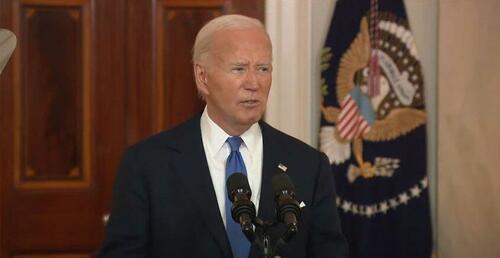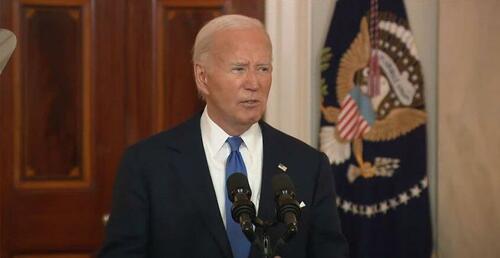
No, President Biden, The Supreme Court Did Not Remove Any Limits On The Presidency
Authored by Jonathan Turley,
President Joe Biden delivered an address from the White House last night on the presidential immunity decision by the Supreme Court. While pledging that he will defend the rule of law, President Biden misrepresented what that law is in the aftermath of Trump v. United States.

While we have often discussed false constitutional claims by the President as well as other false statements, an address of this kind is particularly concerning in misleading citizens on the meaning of one of the most important decisions in history.
As I have previously written, I am not someone who has favored expansive presidential powers. As a Madisonian scholar, I favor Congress in most disputes with presidents. However, I saw good-faith arguments on both sides of this case and the Court adopted a middle road on immunity — rejecting the extreme positions of both the Trump team and the lower court.
One of the most glaring moments in the address came when President Biden declared that “for all…for all practical purposes, today’s decision almost certainly means that there are virtually no limits on what a president can do.”
That is not true.
The Court found that there was absolute immunity for actions that fall within their “exclusive sphere of constitutional authority” while they enjoy presumptive immunity for other official acts. They do not enjoy immunity for unofficial, or private, actions.
The Court has often adopted tiered approaches in balancing the powers of the branches. For example, in his famous concurrence to Youngstown Sheet & Tube Co. v. Sawyer, 343 U.S. 579 (1952), Justice Robert Jackson broke down the line of authority between Congress and the White House into three groups where the President is acting with express or implied authority from Congress; where Congress is silent (“the zone of twilight” area); and where the President is acting in defiance of Congress.
Here the Court separated cases into actions taken in core areas of executive authority, official actions taken outside those core areas, and unofficial actions. Actions deemed personal or unofficial are not protected under this ruling.
It is certainly true that the case affords considerable immunity, including for conversations with subordinates. However, this did not spring suddenly from the head Zeus. As Chief Justice John Roberts lays out in the majority opinion, there has long been robust protections afforded to presidents.
There are also a host of checks and balances on executive authority in our constitutional system. This includes judicial intervention to prevent violations of the law as well as impeachment for high crimes and misdemeanors.
President Biden’s hyper-ventilated response is crushingly ironic. He was vice president when President Barack Obama killed an American citizen without a trial or a charge. When former Attorney General Eric Holder announced the “kill list” policy (that included the right to kill any American citizen), he was met with applause, not condemnation.
The Obama-Biden administration then fought every effort by the family to sue the government. President Biden would have been outraged by any attempt of a Republican district attorney to charge him or President Obama with murder.
He would also be outraged by prosecutors pursuing criminal charges for the deaths associated with the deluge of undocumented persons over the Southern border.
In his address, President Biden also claimed that “the law would no longer” define “the limits of the presidency.”
That is also untrue. This case was remanded for the purpose of defining what of these functions would be deemed private as opposed to official. Even on official actions, former president Donald Trump could be prosecuted if the presumptive immunity is rebutted by prosecutors.
What was most glaring for many civil libertarians was President Biden’s portrayal of himself as a paragon of constitutional fealty. He declared that “I know I will respect the limits of the presidential powers as I have for the last three-and-a-half years.”
That was also untrue. President Biden has racked up an impressive array of losses in federal courts where he was found to have violated the constitution.
This includes rulings that his administration has exceeded his authority and engaged in racial discrimination in federal programs. Indeed, Biden has often displayed a cavalier attitude toward such violations.
For example, the Biden administration was found to have violated the Constitution in its imposition of a nationwide eviction moratorium through the Centers for Disease Control and Prevention (CDC). Biden admitted that his White House counsel and most legal experts told him the move was unconstitutional. But he ignored their advice and went with that of Harvard University Professor Laurence Tribe, the one person who would tell him what he wanted to hear. It was, of course, then quickly found to be unconstitutional.
Biden showed the same disregard over the unconstitutionality of his effort to unilaterally forgive roughly half a trillion dollars in student debt. Courts have already enjoined that effort as presumptively unconstitutional (though an appellate court in one of those cases relaxed aspects of the injunction).
The address was used to reinforce his “democracy is on the ballot” campaign theme. Pundits have repeated the mantra, claiming that if Biden is not elected, American democracy will perish.
While some of us have challenged these predictions, the other presidential candidates are missing a far more compelling argument going into this election. While democracy is not on the ballot this election, free speech is.
For many of us in the free speech community, President Biden has become the most anti-free speech president since John Adams.
As discussed in my new book, “The Indispensable Right: Free Speech in an Age of Rage,” the Biden Administration has helped fund and maintain an unprecedented censorship system in the United States.
That record is hardly supportive for a president claiming to be the defender, if not the savior, of the Constitution.
Tyler Durden
Tue, 07/02/2024 – 14:40






